Arabic
Arabic students learn to speak, listen, read, and write in Modern Standard Arabic, with the opportunity to study Egyptian, Levantine, or Moroccan dialects.
How do cultures communicate? What can literary texts teach us about the beliefs and values of their writers and readers? From ancient works to contemporary narratives, discover how literature and language bridge communities and provoke reflection.
Explore how languages and literature open new perspectives and deepen connections across time and place.
Arabic students learn to speak, listen, read, and write in Modern Standard Arabic, with the opportunity to study Egyptian, Levantine, or Moroccan dialects.
Chinese Language and Culture students explore a vast range of literary and spoken languages, as well as Chinese culture, traditions, and social issues.
French students receive training in language and in the literary, cultural, and intellectual traditions of France and the French-speaking world.
German studies includes instruction in speaking and understanding German, as well exploration of Germany's rich cultural heritage.
Hebrew curriculum provides students with a solid foundation in grammar and vocabulary of Modern Hebrew for conversation and reading; courses in Yiddish are also offered.
The Hindi-Urdu Language Program teaches listening, speaking, reading and writing for effective communication, as well as studying the culture of the Indian sub-continent.
Italian studies offers proficiency-oriented language training and exploration of Italian history, culture, and society from the Middle Ages to the present day.
Japanese studies explores both pre-modern and contemporary approaches to the linguistic and cultural humanities in Japan.
Korean students will learn Korean cultural and linguistic heritages, past and present.
Latin minors gain a good knowledge of Latin, so as to work with primary sources in the original language.
Students concentrating in Polish gain competence in language and knowledge of Polish literature, history, and film.
The Portuguese minor offers linguistic and cultural knowledge through comparative analysis of the cultures and literatures of Portuguese-speaking regions.
Russian studies focuses on Russian culture, literary traditions, international knowledge, or language proficiency.
Spanish studies explores the literary and intellectual traditions in Latin American and Iberian cultures while achieving fluency in the Spanish.
Check out courses that uncover the rich world of languages and literatures.
As a student, you can delve into the study of the languages and literatures through interdisciplinary coursework, internships, community projects, and extra-curricular activities. You also can collaborate with faculty on cutting-edge research.
Nina Bush '24 shares how professors encourage students to bring their perspectives to class discussions, creating a space that values diverse approaches to problem-solving. Bush's journey began with a class on Dante’s Divine Comedy. She applied lessons from Dante to investment banking pitfalls, exploring the morality of finance, and how to navigate corporate America.
I had initially only intended to take Japanese to complete my two-year foreign language requirement but through opportunities offered at Northwestern, I was able to spend time abroad in Japan fully funded, learning more about the language and culture.”
Alex Solivan ’23
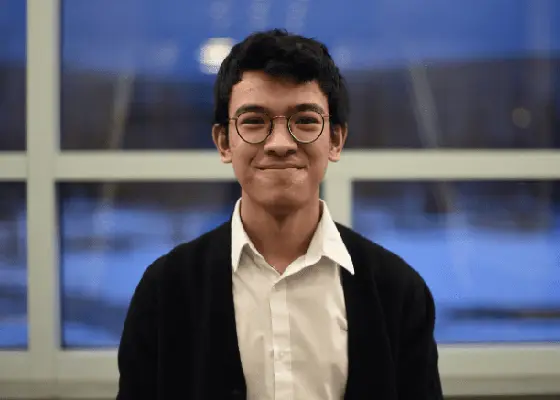
An American studies major with a minor in French at Weinberg College, Dori-Taylor Carter has been involved with the Rainbow Alliance on campus, working to make the University a more hospitable place for LGBTQ+ students. Carter, who came to Northwestern from Los Angeles as a Posse Scholar, is also the recipient of a Mellon Mayes Undergraduate Fellowship.
Get to know some of our dedicated professors who are passionate about teaching and nurturing your success as a student.
The Lawrence B. Dumas Distinguished University Professor of Slavic Languages has been teaching Russian literature for 50 years. He considers books like War and Peace to be valuable tools for learning and practicing empathy.
French and Italian Professor Daniela Pozzi Pavan highlights exciting experiences where students engage in language learning through interactive classes, cultural events, and study abroad opportunities.
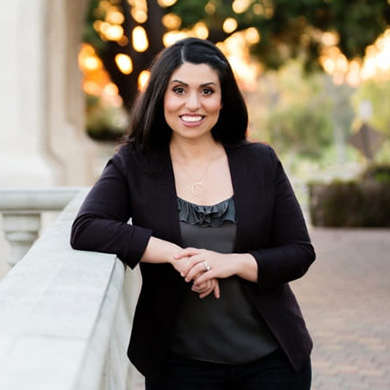
Professor Nazarian explores figurations of violence in early modern French, English and Italian literature. Nazarian is the author of Love’s Wounds: Violence and the Politics of Poetry in Early Modern Europe (Cornell University Press, 2016), which investigates widespread metaphors of violence in early modern French, English, and Italian literature. Her second book project, Violent Sympathies: Literature, Sovereignty and the Hazards of Fellow Feeling brings together early modern literature and contemporary political theory to examine the challenges posed by sympathy for state authority and legitimacy.
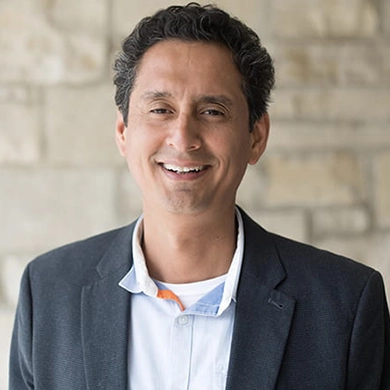
Professor Coronado specializes in Latin American and Andean literatures and cultures. His undergraduate courses range across the 19th and 20th centuries and draw from various disciplines and cultural practices, such as history, archaeology, anthropology, music, photography, and literature. His prize-winning research and academic initiatives have won funding from the National Endowment for the Humanities, the Rockefeller Foundation, the Mellon Foundation, and most recently the American Academy in Berlin, among others.
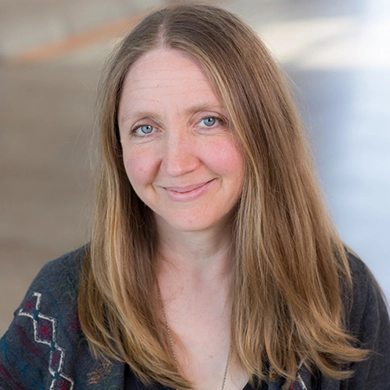
Professor Posner’s project, The Kamerny Theatre: An Artistic History in Political Times focuses on an avant-garde theater founded by Ukranian-Jewish director Alexander Tairov which dissolved during Stalin’s purges (1914-1950). The work will be an archival study of the Theatre’s innovations and international influence in the artistic and political context of the Soviet Union.
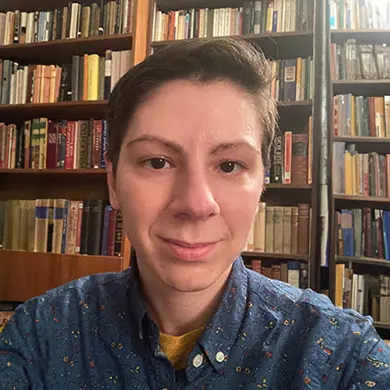
Professor Winters is a classicist and former physicist specializing in ancient mathematics and science. His dissertation, "Schools of Greek Mathematical Practice" (2020), proposed a major revision to the history of Greek mathematics, organizing ancient texts into networks of information transmission and methodology. He spent 2022-23 as a fellow at the American School of Classical Studies in Athens.
Explore student clubs, internships, and campus resources.
In Weinberg College's monthly podcast, Weinberg alumni share their career experiences. Listen to what they have to say about the study of languages and literatures.
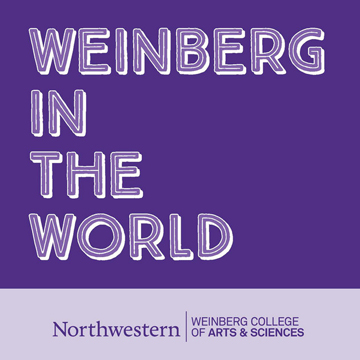

Sailors played a paradoxical role in France's empire. On the one hand, they were the agents of empire, spreading French civilization throughout the world. On the other, they were often drawn from the lower classes of society, and from Brittany, a region of France that was itself a kind of colonized space, where residents mostly spoke Breton rather than French. The sailor was also closely associated with supposedly asocial behaviors: criminality, same-sex sexuality, rampant non-monogamous heterosexuality, and interracial relationships. In this class, we will explore these paradoxes of the figure of the sailor in French literature and film of the 19th and 20th centuries, through the works of Jules Verne, Pierre Loti, Jean Epstein, Ousmane Sembène, and R. F. Fassbinder.
In-depth exploration of key Italian filmmakers in the context of transnational cinema. Focus on relation between filmmakers (including Visconti/Renoir, Rossellini/Godard, and Antonioni/Wenders) and dynamics of cinematic style and cultural influence.
Representations in graphic materials, documentaries, film, theater, folklore, narrative fiction, and popular music of historical, literary, and popular figures in the national imagination. Includes English or Portuguese discussion sections.
Survey of Asian diasporas in the U.S. and elsewhere in the 19th, 20th, and 21st centuries, emphasizing causes of migration, process of settlement, relations with other ethnic groups, and construction of diasporic identities.
We will study the theory and practice of Greek and Roman medicine, looking at ancient texts in translation, ancient artifacts and materials, and some modern scholarship. As a term project, students will learn to think as ancient physicians, diagnosing and prescribing treatments for patients from the Hippocratic case studies. During class discussion, we will engage critically with primary sources and examine the differences between ancient and modern science from a balanced historical perspective. We will also investigate the social, cultural, and economic forces that have affected the development of western medicine throughout its history.
This course places video games in the context of Japanese cultural history from the 1990s to the present. It aims to furnish the historical and conceptual contexts necessary to interpret how games reflect upon the crises faced by Japan at the turn of the new millennium. The course centers on a series of dominant narrative paradigms and subcultural tropes—apocalyptic fantasy, world-type, survival, etc.—and asks how these are rendered in game form. While our focus is ultimately on games as a form of narrative, we aim also to understand how the active and interactive nature of the game medium shapes the meanings that these texts convey.